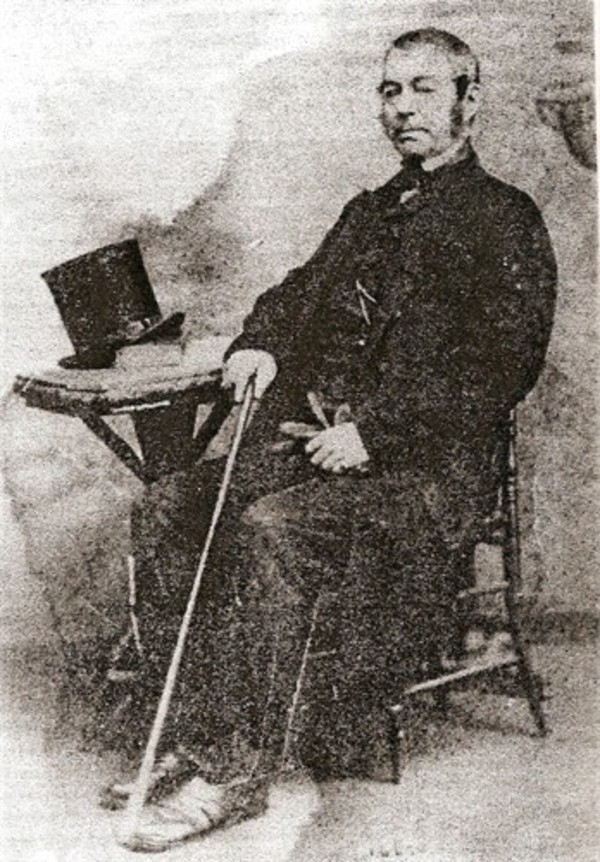
Source: Link
HARRIOTT, JOHN EDWARD, HBC chief factor; b. 1797 in London, England, a son of John Peter Pruden’s sister; d. 7 Feb. 1866 in Montreal, Canada East.
In 1809 John Edward Harriott entered the service of the Hudson’s Bay Company as an apprentice. He went out in the company’s ship King George, apparently spent the winter at York Factory, and in 1811 went to the Saskatchewan District. At the age of 17 Harriott was described as five ft seven in. in height, “fair, long hair, slender . . . sober, modest and obedient, rather idle and illiterate.” He remained in the Saskatchewan district until 1822; was with the Bow River expedition of 1822–23, led by Donald McKenzie*; then at Carlton House, 1823–26, and Fort Assiniboine, 1826–28; and in the Columbia District, 1828–32. In 1832–34 he had charge of Piegan Post in the Saskatchewan District among the Slave Indians of the Bow River country. When Piegan Post was abandoned because of scarcity of trade, Harriott re-established Rocky Mountain House, a difficult post where his skill in Indian relations clearly stood him in good stead. From 1834 to 1854 he alternated between this post and Edmonton House, except for service at Pembina in 1848–49; he was in charge of the Saskatchewan District from Edmonton House in 1841–42 and 1847–48 in the absence of John Rowand*.
Apparently an exemplary employee, Harriott had been promoted clerk during the season of 1816–17, chief trader in 1829, and chief factor in 1846. His uncle, John Peter Pruden, who had left him in charge of Carlton House in 1818, recommended him as “a very promising and interested young man well acquainted in the way of Trade” and “much beloved by the Natives, of a good Temper and very obedient to his Superiors.” Even Governor George Simpson* gave him an excellent character. In 1832 he described him as “A finished trader. Speaks Cree like a native and is a great favourite with Indians; has much influence likewise with the people and is generally esteemed by his colleagues. Strong, active and fit for severe duty. Mild tempered, well disposed, and bears an excellent private character. Came to the country when quite a boy so that he is deficient in regard to education, but in every other respect he is a very effective man.” Father Pierre-Jean De Smet* described him as a “most amiable gentleman” and Paul Kane* in 1847 found him a kind, considerate, and even lavish host at Edmonton House.
Harriott married three times within the network of family relationships that came into being in the service in the first half of the 19th century. His first marriage to his cousin Elizabeth, daughter of Pruden, ended with her death under tragic circumstances. though their precise nature is shrouded in legend. In 1838 Harriott married Anne (Nancy), daughter of John Rowand, to whom he had been contracted in 1835–36. By 1846 they appear to have had four daughters and two sons. Nancy Harriott died in 1850. In 1853, with what his father-in-law considered unseemly haste, Harriott married Frances, sister of Dr John Bunn of Red River.
Harriott retired to the Red River in 1855; his will, made in 1858, indicates also some period of residence in Montreal. He had prospered in the service and in his will was able to dispose of an estate of over $10,000, not including “a house, property, cattle, horses, carriage, carriols.” A strong family man, he had made a generous allowance to his mother until 1844 and in his will he remembered his brother and three sisters and provided handsomely for his widow and his younger children. To his daughter by his first marriage, Margaret, who had married John Rowand Jr, he left £50 “to purchase a gold watch or anything she may fancy to keep in remembrance of her affectionate father.”
[Apart from the account in HBRS, II (Rich and Fleming), Harriott’s career can be followed in the surviving journals in HBC Arch. of the posts in which he served. There are also some references to his affairs in PABC, Donald Ross papers. l.g.t.]
HBC Arch. A.16/60–63; A.31/2–4; A.34/e, f.17; A.36/7; A.44/6, f.180.
Cite This Article
Lewis G. Thomas, “HARRIOTT, JOHN EDWARD,” in Dictionary of Canadian Biography, vol. 9, University of Toronto/Université Laval, 2003–, accessed May 28, 2025, https://www.biographi.ca/en/bio/harriott_john_edward_9E.html.
The citation above shows the format for footnotes and endnotes according to the Chicago manual of style (16th edition). Information to be used in other citation formats:
| Permalink: | https://www.biographi.ca/en/bio/harriott_john_edward_9E.html |
| Author of Article: | Lewis G. Thomas |
| Title of Article: | HARRIOTT, JOHN EDWARD |
| Publication Name: | Dictionary of Canadian Biography, vol. 9 |
| Publisher: | University of Toronto/Université Laval |
| Year of revision: | 1976 |
| Access Date: | May 28, 2025 |



